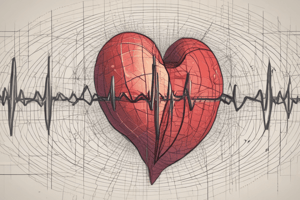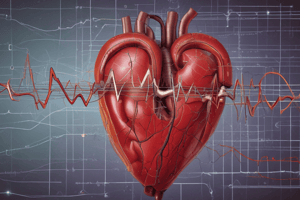Podcast
Questions and Answers
What is the recommended initial defibrillation energy for ventricular fibrillation?
What is the recommended initial defibrillation energy for ventricular fibrillation?
- 100J
- 400J
- 150-200J (correct)
- 360J
What is the characteristic QRS complex duration in ventricular tachycardia?
What is the characteristic QRS complex duration in ventricular tachycardia?
- <100ms
- 100-140ms
- >140ms (correct)
- None of the above
What is the first step in managing asystole?
What is the first step in managing asystole?
- Check for reversible causes
- Initiate CPR
- Confirm asystole in multiple leads (correct)
- Administer medications
Which of the following is a cause of pulseless electrical activity?
Which of the following is a cause of pulseless electrical activity?
What is the first step in the basic life support algorithm?
What is the first step in the basic life support algorithm?
What is the purpose of rhythm recognition in the advanced cardiovascular life support algorithm?
What is the purpose of rhythm recognition in the advanced cardiovascular life support algorithm?
What is the recommended sequence of CPR in the basic life support algorithm?
What is the recommended sequence of CPR in the basic life support algorithm?
Which of the following is not a recommended medication for ventricular fibrillation?
Which of the following is not a recommended medication for ventricular fibrillation?
What is the goal of CPR in asystole management?
What is the goal of CPR in asystole management?
Flashcards
Initial defibrillation energy for ventricular fibrillation?
Initial defibrillation energy for ventricular fibrillation?
150-200J
QRS complex duration in ventricular tachycardia?
QRS complex duration in ventricular tachycardia?
140ms
First step in managing asystole?
First step in managing asystole?
Confirm asystole in multiple leads
Cause of pulseless electrical activity?
Cause of pulseless electrical activity?
Signup and view all the flashcards
First step in basic life support?
First step in basic life support?
Signup and view all the flashcards
Purpose of rhythm recognition in ACLS?
Purpose of rhythm recognition in ACLS?
Signup and view all the flashcards
Recommended CPR sequence in BLS?
Recommended CPR sequence in BLS?
Signup and view all the flashcards
Medication NOT for ventricular fibrillation?
Medication NOT for ventricular fibrillation?
Signup and view all the flashcards
Goal of CPR in asystole management?
Goal of CPR in asystole management?
Signup and view all the flashcards
Study Notes
Cardiac Arrest Rhythms
Ventricular Fibrillation (VF)
- Treatment:
- Defibrillation: immediate shock delivery (biphasic 150-200J, monophasic 360J)
- CPR: continue for 2 minutes before re-analysis
- Medications: amiodarone or lidocaine (if VF persists after defibrillation)
Ventricular Tachycardia (VT)
- Diagnosis:
- Wide QRS complex (>140ms)
- Regular rhythm
- P-waves not present or dissociated from QRS complex
- Monomorphic (uniform) QRS shape
Asystole
- Management:
- Confirm asystole in multiple leads
- Check for reversible causes (e.g., hypoxia, electrolyte imbalance)
- CPR: continue until return of spontaneous circulation (ROSC) or termination of resuscitation efforts
- Medications: none recommended
Pulseless Electrical Activity (PEA)
- Causes:
- Hypovolemia
- Hypoxia
- Hydrogen ions (acidosis)
- Hypothermia
- Hypokalemia or hyperkalemia
- Tamponade (cardiac)
- Tension pneumothorax
- Toxic substances
- Cardiac rupture
Cardiac Arrest Algorithms
- Basic Life Support (BLS):
- Call for help
- Check airway, breathing, and circulation (ABC)
- CPR: 30 chest compressions, 2 breaths
- Defibrillation (if indicated)
- Advanced Cardiovascular Life Support (ACLS):
- Rhythm recognition and management
- Medication administration
- Cardioversion (if indicated)
Electrocardiogram (ECG)
- Interpretation:
- P-waves, QRS complex, T-waves
- Rate, rhythm, axis, and intervals
- Identification of cardiac arrest rhythms (VF, VT, asystole, PEA)
Studying That Suits You
Use AI to generate personalized quizzes and flashcards to suit your learning preferences.




